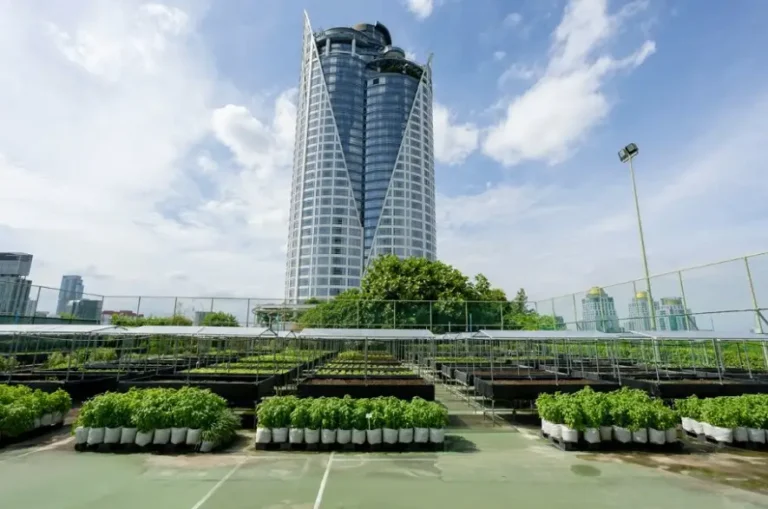
Bangkok Hotel News: Thailand has emerged as the undisputed global leader in hotel room rate growth for 2024, marking a dramatic rebound and a robust indication of renewed international travel confidence. According to SiteMinder’s released Hotel Booking Trends report, the country recorded a staggering 15 percent increase in average daily hotel room rates compared to 2023.

Image Credit: BMA
This growth not only places Thailand ahead of all other nations worldwide but also marks it as the only country to achieve double-digit expansion in this key revenue indicator.
SiteMinder, an internationally recognized hotel commerce platform that facilitates over 125 million hotel bookings annually, found that the average daily rate (ADR) for Thai hotels rose from 4,648 baht in 2023 to 5,377 baht in 2024. This Bangkok Hotel News report highlights how the upward trend reached its zenith in December 2024, with occupied room rates peaking at 6,460 baht — an 11 percent year-over-year increase. The numbers are particularly notable given the challenges faced by the global travel industry in recent years, including residual impacts of the COVID-19 pandemic, geopolitical instability, and inflationary pressures affecting travel affordability.
Despite the recent earthquake in Myanmar and Thailand, and the global economic slowdown caused by America’s tariffs on various countries, hotel rates and occupancy rates are still rising in Thailand.
International Appeal Drives Growth
Thailand’s tourism magnetism continues to be its strongest asset. The SiteMinder data reveals that 77 percent of all hotel check-ins in Thailand in 2024 were made by foreign travelers — a figure vastly higher than the global average of 48 percent. Only Austria reported a higher percentage of international check-ins, emphasizing Thailand’s dominant appeal in the Asian region and beyond.
The influx of international tourists was not only broad in scope but deep in engagement. Bookings at Thai hotels were typically made far in advance, with a 27-day lead time on average — the longest in Asia and approaching the 29-day window recorded in 2019. This extended planning horizon suggests increased traveler confidence and a desire to secure desirable accommodations well before arrival.
Additionally, tourists were staying longer. Over 15 percent of bookings in Thailand lasted three nights or more, placing the country fifth globally in terms of extended stays. This figure significantly outpaces the global average of 11 percent and reflects Thailand’s success in marketing itself as a premier leisure destination, rivaling countries like Portugal, Colombia, Mexico, and Spain.
More Balanced Seasonal Distribution
Interestingly, while December remained the busiest month for Thai hotels — traditionally tied to the high season and year-end holidays — reliance on this period alone has decreased. The report notes a more evenly spread flow of tourists during the cool months of 2024, demonstrating a strategic shift in Thailand’s tourism dynamics. A more balanced distribution of arrivals means less strain on infrastructure and services during peak periods and a more sustainable revenue stream for hotels year-round.
Resilience and Innovation Among Thai Hoteliers
Supakrit Phansomboon, Thailand’s country manager for SiteMinder, expressed optimism over the evolving landscape. “The rise in average room rates in Thailand, coupled with the strong resurgence of international guests, suggests not only a lucrative year for Thai properties, but a local hotel industry that is thriving amid bolstered confidence to travel in the country,” he said.
Phansomboon credited much of the success to the dynamic adaptability of Thai hoteliers, who have embraced new opportunities and leveraged data-driven strategies to remain competitive. “With longer booking windows, extended hotel stays and steadier visitor volumes year-round, Thai hotels are now in a clearer position to be more responsive to new opportunities that can optimise their revenue,” he noted.
He emphasized that the growing global appetite for experience-based travel — particularly for events, festivals, and cultural immersion — presents a golden opportunity for Thai hotels to craft bespoke experiences and value-added packages.
Top Channels Powering Bookings
SiteMinder’s report also unveiled the top 12 booking channels by gross revenue for Thai hotels in 2024:
-Booking.com
-Agoda
-Hotel websites (direct bookings)
-Expedia Group
-Trip.com
-Hotelbeds
-Tiket.com
-Goibibo & MakeMyTrip
-Traveloka
-WebBeds
-Klook
-TBOHolidays
The appearance of Klook — a platform popular among travelers from Singapore, Hong Kong, Taiwan, and the Philippines — as a major revenue generator reflects the rising influence of Asian travelers. Furthermore, Trip.com’s continued strong performance underlines China’s dominant role as Thailand’s leading source market. This surge has been amplified by the Thai government’s decision to grant visa exemptions to Chinese tourists starting in early 2024.
Direct Bookings Make a Comeback
Another noteworthy trend is the resurgence of hotel websites as a key booking channel. After falling behind Expedia in previous years, direct hotel bookings surged back into the top three. SiteMinder’s global findings support this trend, reporting that hotel websites generated an average of USD 519 per booking — 8.5 percent higher than in 2023 and nearly 60 percent higher than the USD 320 average recorded for bookings through online travel agents (OTAs).
“Travellers who book directly typically choose higher-value rooms, stay longer, and add extras,” explained Phansomboon. “Each of these factors represents a significant opportunity for hotels to provide those exclusive deals travellers are looking for, and our findings show that many hotels are doing this effectively.”
However, he also cautioned hoteliers against ignoring the value of third-party platforms. “They offer unmatched reach and simplicity, as their dominance in Thailand’s Top 12 booking sources clearly shows,” he added. He encouraged hotels to maintain parity in user experience across both direct and third-party channels, emphasizing the importance of smooth payments and strong security protocols.
Outlook for 2025 and Beyond
As Thailand closes out a record-breaking year in hospitality growth, the key takeaways from SiteMinder’s 2024 report offer both a celebratory look back and a strategic lens for future planning. The country’s ability to attract high-value international guests, support extended stays, and reduce overreliance on peak periods illustrates a maturing and increasingly resilient hotel sector.
Looking ahead, Thai hoteliers must continue leveraging data insights, diversify their marketing strategies, and invest in seamless digital experiences across both direct and OTA booking platforms. With global interest in Thailand continuing to surge and infrastructure investments ongoing, the country is well-positioned to maintain its edge.
Furthermore, the return of confidence among both leisure and business travelers presents opportunities to tap into niche markets such as wellness tourism, culinary travel, digital nomad packages, and event-based stays. Government partnerships in easing travel restrictions and improving connectivity will be pivotal in sustaining momentum. As long as hoteliers remain adaptive, tech-savvy, and guest-focused, Thailand’s hotel industry is poised not only to lead Asia but to influence global hospitality trends in the years ahead.
For the latest on the global hotel market, keep on logging to Bangkok Hotel News.
You May Also Like:






